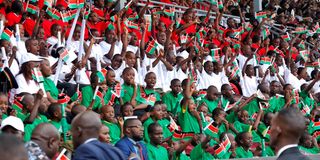Kenya's lost soul and why this is the right time for a reset

Kenyans during the 60th Madaraka Day celebrations at the Moi Stadium, Embu on June 1, 2023.
I’ve written before in this column about Kenya’s poverty of philosophy and its philosophy of poverty. We are a society that’s been increasingly coarsened and hardened like a drug addict. We are now addicted, and attracted, to things that impoverish the mind, the body and the soul. We are adrift in the wilderness.
I know that some people would have us believe that our vacuousness is a result of a movement away from established religions and God.
In fact, the reverse is true – as Kenyans have become more outwardly pious, they have become increasingly crude and inhumane. Our national soul, which is lost, is in the hands of seductive demons who beckon us with vices of every type.
Let me admit I don’t claim to be a religious man. However, I try to live a virtuous life and perform good deeds on earth. I am not always successful in this noble quest, but I try – very hard. I find it odious that those who cover themselves in religious piety are the worst offenders. They may not be as nakedly evil as the fellow who ran the Shakahola killing fields.
They may not physically kill the body, but they certainly murder the spirit, the soul.
So, I often ask, who is the worse person – the one who openly attacks you with a knife, or the one who secretly poisons you with arsenic? Personally, I would opt for the former.
Also read: Kenya’s dumb traffic culture
Let me address several facets of our lost national soul. I don’t want to belabour this point, but it’s been a pet peeve of mine for decades. I believe European colonialism with Christianity as the necessary palliative – and invasions by Arab cultures through Islam – dealt Black Africans twin blows.
The blows were aimed at our identities and spiritualities. I know cultures are dynamic, and impure. In fact, that’s why societies advance. But every society or people have a dominant fingerprint that unalterably sets it apart from others. It’s that genius of the culture that exists in a dialogic relationship with others to redefine and improve itself. That’s why I have no problem with cultural penetration and counter-penetration.
Multiculturalism and cross-fertilisation of ideas and cultures are essential to any society’s growth. But that’s not the same as the evisceration and subordination of one culture by another.
I submit here that European Christian and Arab Muslim universes enslaved our cultures and took over their souls. They left us soulless. In essence, they are both “colonial” projects whose messianic visions don’t permit the free existence of “the other”.
Hatred for blackness
That’s why I believe our intellectual eclipse occurred when Black Africa was subsumed into these two universes. They bred – and continue to multiply – our hatred for our blackness and our heritages. We even raise our children either facing the West, or the Arab world. We don’t look inwards first, and then outwards second.
From the foregoing, it’s not a difficult leap to deduce that our educational system – which is totally unstable and without an indigenous moral, cultural or philosophical anchor – orbits hopelessly in space.
Also read: The evil of casual racism
We educate our children to aspire to go to Harvard or Cambridge. That’s the pinnacle of success according to parents in Kenya. Everything else is third class. I’ve written before that we allow so-called international schools to reject Kiswahili in their curriculum. How we can we denigrate our national language and still claim to be a proud people?
We need an educational system and curricula that can instil respect and inculcate humanity in the Black African child. Let’s start recovering our national soul in our schools.
Secondly, we must reinvent our elite – political, social and cultural. The political elite needs to forge a national consensus about the country we call Kenya. We need to answer the question whether Kenya is only a country or a nation?
If Kenya is a nation, what’s its national zeitgeist? What, for example, distinguishes Kenya from Chad? Is it simply a geographic address on the planet? Who, or what, is Kenyan?
How does a Kenya differ from an American? Is it DNA, language, culture, identity? If there are no differences, why then should Kenya exist as a sovereign state? Should it be abolished and absorbed in, say, Tanzania? If a Kenyan as a distinct creature doesn’t exist, should we bother inventing one?
I raise these questions not to be facetious, but spur us to look hard in the mirror and ask, who are we? Do we like us? Are we in love with us, or are we in love with an image of someone else whom we mistake for us?
Are we dumb copies of others? If so, why do we treat those others as the originals that we must ape and mimic? Even if we mimic them, can we substitute their souls for ours? Can we really become them?
Or are we condemned to forever be their inferiors? I want us to let this conversation marinate, and then pick it up as a people.
Makau Mutua is SUNY Distinguished Professor and Margaret W. Wong Professor at Buffalo Law School, The State University of New York.
@makaumutua.





